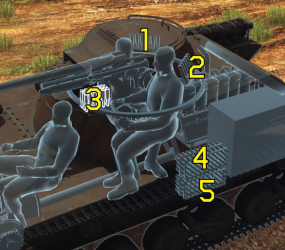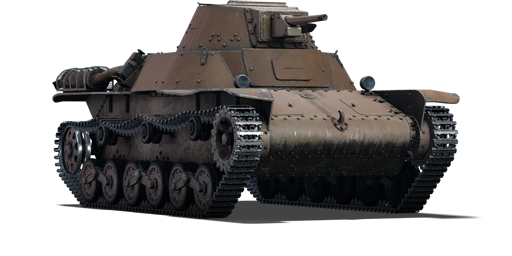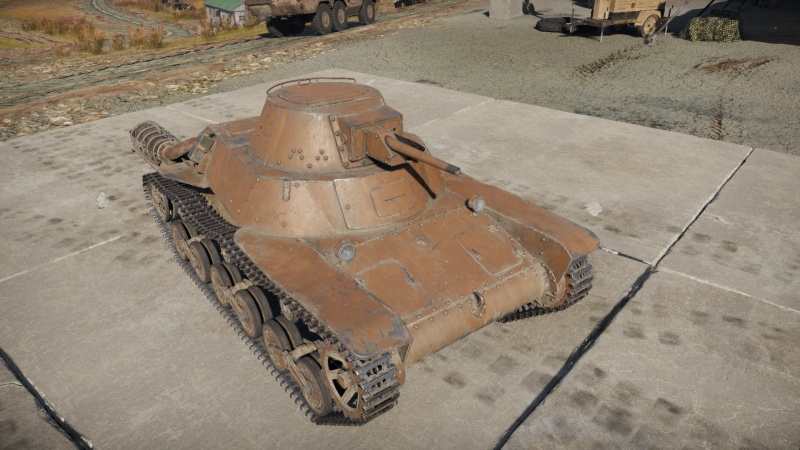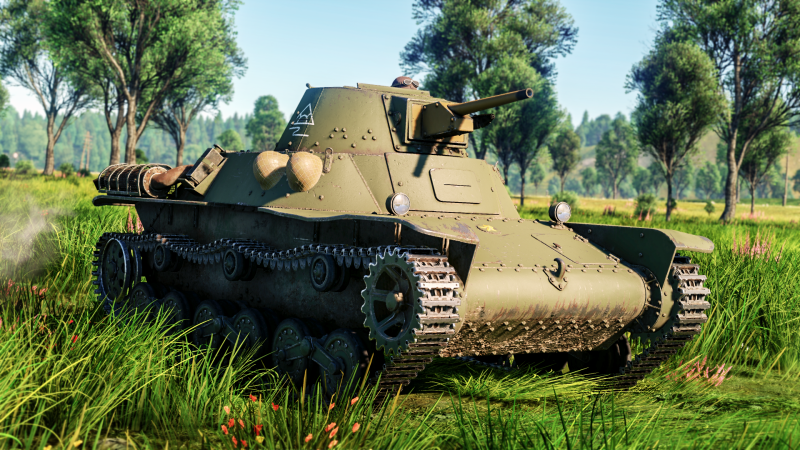Ke-Ni
Contents
Description
The Type 98 Ke-Ni (九八式軽戦車「ケニ」) is a reserve rank I Japanese light tank with a battle rating of 1.0 (AB/RB/SB). It was introduced along with the initial Japanese Ground Forces tree in Update 1.65 "Way of the Samurai".
General info
Survivability and armour
With around 12 mm of armour all around, this tank is barely bulletproof. German and British machine guns can even knock you down at point-blank range. Your crew is cramped and not numerous, which makes surviving a shot extremely unlikely. This is definitely not the tank to expose to any kind of shots. With its small turret and impressive gun depression, hull-down positions improve this vehicle's survivability and should be sought whenever possible.
Armour type:
- Rolled homogeneous armour
| Armour | Front | Sides | Rear | Roof |
|---|---|---|---|---|
| Hull | 12 + 10 mm (20-27°) Front plate 12 mm (71°) Front glacis 12 mm (2-58°) Lower glacis |
12 mm (29-34°) Top 12 mm Bottom |
10 mm (52°) Top 10 mm (12-52°) Bottom |
10 mm |
| Turret | 12 mm (0-81°) Turret front 16 mm Gun mantlet |
12 mm (25°) | 12 mm (25°) 10 mm (24-25°) Rear door |
9 mm |
Notes:
- Suspension wheels and tracks are both 15 mm thick.
Mobility
| Game Mode | Max Speed (km/h) | Weight (tons) | Engine power (horsepower) | Power-to-weight ratio (hp/ton) | |||
|---|---|---|---|---|---|---|---|
| Forward | Reverse | Stock | Upgraded | Stock | Upgraded | ||
| Arcade | 56 | 8 | 7 | 141 | 248 | 20.14 | 35.43 |
| Realistic | 50 | 8 | 115 | 130 | 16.43 | 18.57 | |
This tank is quite fast and can achieve surprising feats of mobility. Coupled with a good turret traverse speed, this tank can be reliably used in flanking manoeuvres. With its narrow tracks and good power-to-weight ratio, this tank is fast on almost any ground but easily loses speed on rough terrain, steep hills, and sharp turns. Another good characteristic of this tank is its reverse speed of -7 km/h, which allows it to effectively use overextend tactics (peek-a-boo).
Modifications and economy
Armaments
Main armament
Offering an improved gun and ammunition selection compared to the Ha-Go, this tank offers a good learning curve from its predecessor. Though this cannon does not have the best penetration at rank I, the trademark Japanese APHE has a good amount of HE filler and ensures that each penetrating shot deals damage. The gun only has one type of ammunition.
| 37 mm Type 100 | Turret rotation speed (°/s) | Reloading rate (seconds) | |||||||||||
|---|---|---|---|---|---|---|---|---|---|---|---|---|---|
| Mode | Capacity | Vertical | Horizontal | Stabilizer | Stock | Upgraded | Full | Expert | Aced | Stock | Full | Expert | Aced |
| Arcade | 110 | -15°/+18° | ±180° | Vertical | 16.18 | 22.40 | 27.20 | 30.08 | 32.00 | 4.33 | 3.83 | 3.53 | 3.33 |
| Realistic | 10.12 | 11.90 | 14.45 | 15.98 | 17.00 | ||||||||
Ammunition
| Penetration statistics | |||||||
|---|---|---|---|---|---|---|---|
| Ammunition | Type of warhead |
Penetration @ 0° Angle of Attack (mm) | |||||
| 10 m | 100 m | 500 m | 1,000 m | 1,500 m | 2,000 m | ||
| Type 1 APHE | APHE | 47 | 44 | 32 | 22 | 15 | 10 |
| Shell details | ||||||||||||
|---|---|---|---|---|---|---|---|---|---|---|---|---|
| Ammunition | Type of warhead |
Velocity (m/s) |
Projectile mass (kg) |
Fuse delay (m) |
Fuse sensitivity (mm) |
Explosive mass (TNT equivalent) (g) |
Ricochet | |||||
| 0% | 50% | 100% | ||||||||||
| Type 1 APHE | APHE | 700 | 0.72 | 1.2 | 9 | 12.8 | 47° | 60° | 65° | |||
Ammo racks

| Full ammo |
1st rack empty |
2nd rack empty |
3rd rack empty |
4th rack empty |
5th rack empty |
Visual discrepancy |
|---|---|---|---|---|---|---|
| 110 | 105 (+5) | 99 (+11) | 81 (+29) | 41 (+69) | 1 (+109) | No |
Only left side: 81 (+29)
Machine guns
| 7.7 mm Type 97 | ||||
|---|---|---|---|---|
| Mount | Capacity (Belt) | Fire rate | Vertical | Horizontal |
| Coaxial | 3,000 (20) | 499 | N/A | N/A |
Usage in battles
Being a light tank, the Ke-Ni cannot engage enemies head-on. To succeed in an assault, you need to be sneaky. Flanking, avoiding the enemy and going behind them is your best option. The 37 mm gun can penetrate most Rank I tanks if you hit their weak spots, though it may take a few shots to destroy an enemy. Your first shot should be to take out the enemy gunner so they can't retaliate. After that, take out their driver so they can't retreat. Never linger in an open field since anything can kill you with ease. Use your good gun depression to keep a hull-down position behind hills and just pop out to shoot. Hide in bushes or behind buildings or rocks. You are quite small, so use this to your advantage.
Pros and cons
Pros:
- Low profile
- Slightly improved 37 mm cannon able to penetrate the majority of rank 1 tanks it faces
- Coaxial machine gun (rare for a early Japanese tank)
- Large ammo load
- Short reload time
- Small engine, which is hard to hit from the front
- Good turret traverse
- -15° of depression
- Has shoulder lock, which is a primitive form of the vertical stabiliser
- Good reverse speed (-7 km/h)
Cons:
- Relatively little armour, can be penetrated by 12.7 mm machine guns
- Hard to angle due to the shape of the armour
- Only 3 crew members
- Crew is cramped
- Only one ammunition choice, can have difficulty dealing with heavily armoured tanks
History
Development
The Type 98 Ke-Ni was a replacement program started in 1938, for the Type 95 Ha-Go. The tank was supposed to have the same weight but with thicker armour. During development both Hino Motors and Mitsubishi Industries built a prototype being the Chi-Ni* Model A (Ko) and Chi-Ni* Model B (Otsu) respectively. As Hino built a suspension similar to on the Ha-Go, Mitsubishi went for a similar design to the Christie suspension. During trails the Model A performed stunningly better, especially offroad and was adopted as the Type 98 Ke-Ni.
But as the battle results of the Ha-Go came in, the Army realized the poor strength and disorganization of the Chinese army was no issue for the adequate ageing Ha-Go and didn't need direct replacement.
Only with the start of the Pacific war high command started taking note of how the American's .50 cal is enough to punch through the rather thin armour of the Ha-Go and eventually gave the light tank improvement contract to Hino with effective production starting in 1942. Though as many Japanese tanks and army manufacturing, production would be hampered by the Navy's resource priority leaving the total amount of Ke-Ni's built rather low at roughly 104 built.
| *Not to be confused with the Chi-Ni medium tank prototype. |
Design
Comparing the Ke-Ni to the Ha-Go, it featured thicker, welded armour of improved shape, the height of the tank was 50 cm lower in profile and slightly lighter and shorter. With the use of a Mitsubishi Type 100 6-Cylinder air-cooled diesel engine with 130 horsepower, it allowed the vehicle to travel at 50 km/h (31 mph) even with its thicker armour.
Three pairs of bogies with six road-wheels connected to the chassis using bell cranks, this gave the tank better stability over its predecessor which only had two pairs of bogies with four road-wheels which was a major complaint of Ha-Go crew as it would rock the tank on unfavourable terrain.
The driver was located in a central position of the chassis and received a standard wheel.
In contrast to the one-man turret of Type 95 Ha-Go, the Type 98 had a two-man turret, which featured additional room for a loader next to the gunner/commander. The gun was a Type 100 37 mm tank gun with vertical elevations of -15 to +20 degrees in the turret, a muzzle velocity of 760 m/s, and also a coaxial Type 97 (7.7 mm) machine gun instead of in the back of the turret.
Media
- Skins
See also
Links to the articles on the War Thunder Wiki that you think will be useful for the reader, for example:
- reference to the series of the vehicles;
- links to approximate analogues of other nations and research trees.
External links
Paste links to sources and external resources, such as:
- topic on the official game forum;
- other literature.
| Hino Motors, Ltd. (日野自動車株式会社) | |
|---|---|
| Light Tank | Ke-Ni |
| SPAA | Ta-Se · So-Ki |
| Japan light tanks | |
|---|---|
| Type 89 | I-Go Ko |
| Type 95 | Ha-Go · Ha-Go Commander |
| Type 98 | Ke-Ni |
| Other | Ka-Mi |
| IFV | Type 89 |
| RCV | Type 87 RCV (P) · Type 87 RCV · CTWV RCV |
| MCV | Type 16 (P) · Type 16 (FPS) · Type 16 |
| USA | ▅M24 · ▅M41A1 |






